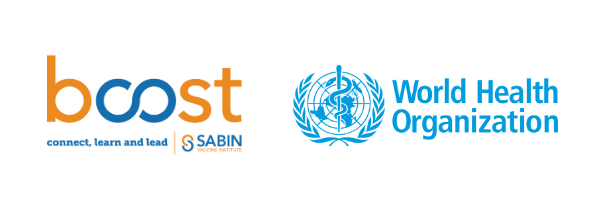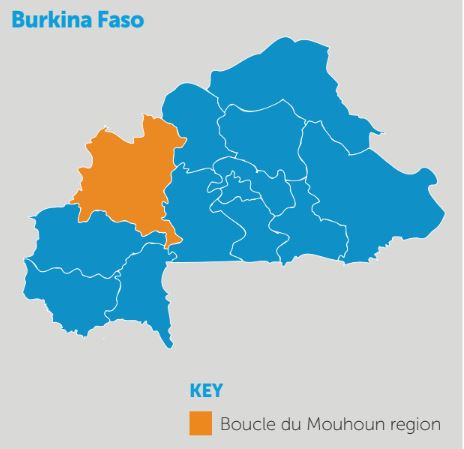Volunteer Health Workers Restore Immunization Services In Burkina Faso’s Conflict Zones
In May 2022, Sabin’s Boost Community and the World Health Organization (WHO) launched the first cohort of the "COVID-19 Recovery for Routine Immunization Programs Fellowship". The aim of this program was to strengthen the capacity of national and sub-national immunization professionals to plan and implement immunization programming during the COVID-19 recovery period, with the ultimate goal of reversing the declining rates of immunization coverage. After an intensive live engagement series, Fellows were tasked with drafting their own strategic proposal for implementation or case study for publication. This series of Bright Spots share Fellows' key learnings and takeaways from the program.
Several factors have converged to interrupt routine immunization campaigns in parts of Burkina Faso. Political instability, frequent deadly attacks on civilian settlements by armed groups since 2016 and the COVID-19 lockdowns led to the closure of many health centres across the country. Medical staff stopped travelling to remote villages under the threat of violence to conduct vaccination drives.
“Many villages were abandoned by health services,” according to Kouliga Kaboré, Expanded Programme for Immunization (EPI) manager of the Regional Directorate of Health and Public Hygiene, responsible for the Boucle du Mouhoun region. Routine vaccinations against tuberculosis, rubella, measles, Hepatitis B, diphtheria, polio and others were no longer being administered, causing a resurgence of some of these preventable diseases.
Inspired by what he had learned when he took part in the COVID-19 Recovery for Routine Immunization Programs Fellowship, Kaboré had an idea. If medical staff could no longer get to vaccinate vulnerable communities, perhaps they could do it themselves. He designed a project based on the idea that volunteer community health workers (CHWs) could be trained to deliver vaccination campaigns.
Immunization Targets
Resume routine vaccination in 51 villages that no longer received visits from health workers
Train 92 community actors on routine EPI
Vaccinate 1,578 children under 5 years old
Cover Tougan and Nouna towns, Northwestern Burkina Faso and 27 villages in the area
The immunization program recovery project, funded by the Fellowship, required CHWs to mobilize the populations of their villages monthly and bring children under the age of five who were behind on their immunizations to the vaccination drive on a given day. On vaccination day, the CHWs were required to travel to the nearest open health centre, collect vaccine doses and all the required equipment, including data collection materials, vaccinate the children and then return the remaining doses and the vaccination records to the health centre, all within the same day.
The priority vaccines were oral polio, because it is easy to administer, measles and rubella because there was a resurgence of these diseases, meningococcal vaccine against meningitis, as well as pentavalent (5 in-1) vaccine.
Training
The training took place over three days and brought together 90 CHWs, 35 from Tougan and 55 from Nouna. A team of 4-5 facilitators, including Kaboré, accompanied ocials from the health district to the site. “The training took the form of theoretical explanations, followed by practical demonstrations using oranges and mannequins. On the last day of the training, we took the training participants to urban health centres where they took turns vaccinating children under close supervision.” Kaboré said. “They were trained in pairs, so that they could support each other and offer a quality service thereafter” Kaboré added, concluding, ”Overall, the training went very well.”
Within two weeks of the training, each pair of participants was expected to begin organizing and carrying out monthly vaccination drives in their villages while the training was still fresh. The project allocated to each pair FCFA 5,000 per month (just over USD 8) to cover their travel costs. “We created WhatsApp groups that would allow us stay in touch with the CHWs and assist them with any difficulties they might experience in the course of organising and carrying out the vaccination drives,” Kaboré said. In Tougan the monthly vaccination drives were carried out between October to December 2022, while in Nouna they took place between January to March 2023.
Within the first month, the CHWs vaccinated more than the target number of children. Over the course of three months 2,428 vaccine doses were administered, including boosters.
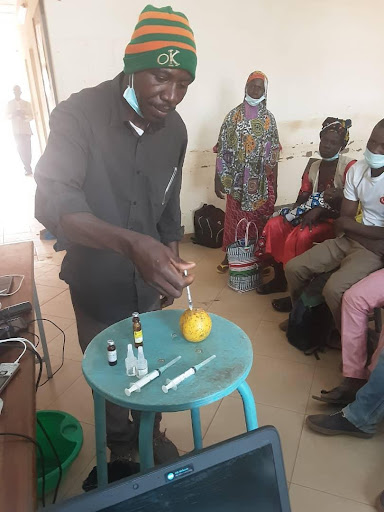
This success did not come without challenges. “The most pressing challenge was budgetary constraints,” Kaboré said. The Sabin grant paid for the training of the community health workers and their monthly travel expenses. Had more funds been available, according to Kaboré, there could have been five days of training instead of three, a kit containing basic supplies needed by each CHW could have been provided, and a round of visits to community leaders to ask for their support in carrying out the project would have been possible. Furthermore, after the vaccinations, he would have liked to hold debriefing workshops and carry out monitoring and evaluation of the project.
The second significant challenge was communication. Armed groups often sabotage telecommunication masts, cutting off communication in some areas completely and making it difficult for Kaboré and the other district health authorities to use mobile phones or WhatsApp to stay in touch with all the CHWs. “CHWs were reduced to sending us handwritten notes with people travelling to Tougan or Nouna. This meant that rapid response was impossible,” Kaboré said.
The third challenge was insecurity. “Sometimes an armed attack took place a few days before a planned vaccination drive, forcing a postponement,” Kaboré recalled. “The security situation disrupted fuel supplies, leaving public transport vehicles grounded, preventing CHWs from travelling to the health centres to collect vaccines.”
Kaboré described the experience of leading this project as “beautiful”, with some caveats: “This experience was six months of stress but also of joy. As I received the vaccination data every month, I was encouraged to see that, by working together, we were able to protect so many children from preventable diseases. However, when I heard that villages within the project zone were attacked by armed groups, it was very frightening and stressful for me.”
He was pleased by the reaction of the community to the project:
“Before the project, I wondered whether mothers would agree to have their children vaccinated by lay health workers from their own communities. We learned that mothers did not present an obstacle, that they understood the importance of vaccinating children against diseases.”
Kaboré expressed hope that individual villages would fund their CHWs to continue the monthly vaccination campaigns.“ In Tougan this has not taken place. In Nouna district, however, some villages have taken it upon themselves to fund vaccination drives in April and May 2023.”
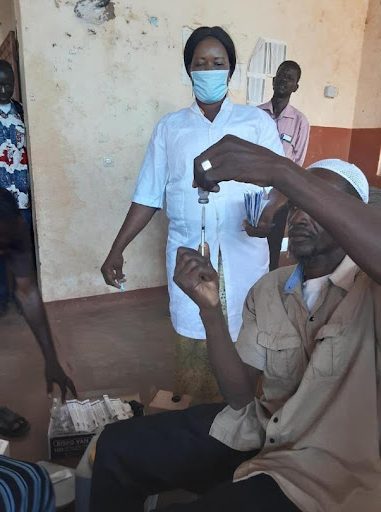
Recommendations
With adequate support, Kaboré believes, the vaccination project can be sustainable. First, he says, three days of training for the CHWs is far from enough. What is needed, he says, is continuous training and supervision. He also recommends the development of video tutorials that CHWs can refer to via their mobile phones and recommends the standardisation of the training across the country: “I spent a week or two simplifying the classic technical medical training materials so that the CHWs could understand them. It would be useful to use these simplified materials to standardise the training of CHWs across the country, particularly in the regions that are hard-hit by violence.” Finally, Kaboré says, adequate funding is key. “When you undertake this kind of intervention, but can only do the bare minimum, the quality [of the project] sufferers.”
Kaboré remains positive about the future of the initiative:
“What I have learned… is that it is, indeed, possible to delegate the task of vaccinating to communities… Volunteer community health workers only need the right support.”
| Final Results | |||
|---|---|---|---|
| Cumulative children vaccinated in 3 months | No. of trained CHWs | No. of villages covered | |
| Health District: Tougan | 2,428 | 35 | 23 |
| Health District: Nouna | 1,472 | 55 | 28 |
| Region Total | 3,900 | 90 | 51 |
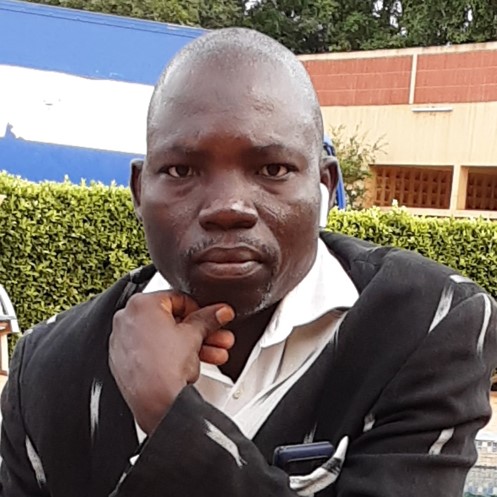
2022 Fellow & Contributor
Kouliga Kaboré is a Regional EPI (Expanded Programme for Immunization) Manager, Regional Directorate of Health and Public Hygiene, Boucle du Mouhoun region, Burkina Faso. “After participating in the Fellowship, Kabore saw an opportunity to boldly solve the problem that he had witnessed around immunization gaps. His participation in the Fellowship programme was motivated by his desire to grow his skills in the area of EPI management and to share experiences with other professionals in this area.”
